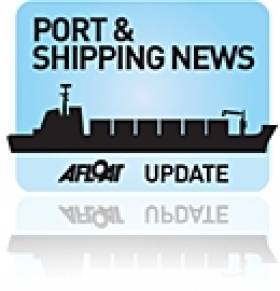Displaying items by tag: Co. Wicklow
Those participating are asked to assemble at the Hibernia Inn (near Bray Dart Station) from 13.00 hours. At 14.00 hours, an anchor shaped wreath will lead the procession of wreaths to the north Bray pier-head where a memorial service will be held, at which representatives of those in attendance will be invited to speak.
This will be followed by one minute's silence after which, those accompanying the wreaths will embark on the flotilla to a position approximately five-cables due east of Bray Harbour.
Anyone who would like to assist in the preparations and to remember those who have been lost are invited to attend. For further information, contact Tony O'Grady, Captain, (retired) on behalf of "Mariners with Memories" on Tel: (01) 276 0575 Mob: 087 245 4071 Email: [email protected] in addition to this LINK.
The Future’s Green, Bright and Orange
This month ASN are due delivery of the 4,700 gross tonnes Arklow Bridge, the second 'B' class newbuild was also built by the Dutch company of Bodewes Shipyards B.V. She is the fifth vessel to carry this name since Arklow Shipping was founded in 1966.
The Arklow Bridge is registered in St. John's the capital of the Caribbean island of Antigua where she will be flagged. Antigua became an associated state of the Commonwealth until it was disassociated from Britain 30 years ago.
Her sister Arklow Brook entered service this year and is designed with two holds with a total (grain and bale) capacity of 9473.1m3 or an equivalent of 33,4524 ft3.
For cargo-separation the holds can be sub-divided by a portable bulkhead in up to 8 positions. In addition to carrying agricultural-based cargoes, the 116m (OA) overall long vessel can handle 177 (TEU) containers in the hold and another 88 can be stowed on top of the hold's hatch covers. Both the holds are fitted with dehumidifier's.
The power-plant is derived from a MaK 6M32C 2999kW main engine with a Renk gearbox and Berg controllable pitch propeller that provides around 12 knots.
With the entry of Arklow Bridge, the combined fleet is over 40 ships that trade in the north-west of Europe and the Mediterranean. For further vessel statistics of the sisters click here and for a photo of the new vessel click this link.
Asides the Rotterdam based operation of ASN, the Irish side of the company is the largest indigenous owned shipping company in terms of Irish-flagged and registered tonnage. Arklow is not only the headquarter's of ASL but the homeport is also where the vessels are registered.
- Dublin Port
- Co. Wicklow
- Arklow Shipping
- Newbuilds
- The Netherlands
- Arklow Shipping Ltd
- Ports and Shipping News
- Caribbean
- DryDock
- Antigua
- British
- Dublin Port news
- Arklow Bridge
- Arklow Brook
- ASN
- Arklow Shipping B.V.
- Irishflagged
- Irishregistered
- Arklow Future
- Bodewes Shipyards
- Dutchflagged
- Antiguaflagged
- Mak
- The Commonwealth
- River Avoca
Port of Arklow
Port of Arklow
(Courtesy of WikiPedia , the free encyclopedia)
Arklow (In Irish: An tInbhear Mór, meaning 'The great estuary'), also known as Inbhear Dé from the Avonmore river''s older name Abhainn Dé, is a historic town located in Co. Wicklow on the east coast of Ireland. Founded by the Vikings in the ninth century, Arklow was the site of one of the bloodiest battles of the 1798 rebellion. It is now a thriving commuter town with a population of 11,759 at the 2006 census, making it the third largest town in the county.
Arklow is situated at the mouth of the River Avoca (formerly Avonmore), the longest river entirely within Co. Wicklow. The town is divided by the river, which is crossed by the Nineteen Arches bridge, a stone arch bridge linking the south or main part of the town with the north part, called Ferrybank. The Nineteen Arches bridge is the longest hand made stone bridge in Ireland and is considered a famous landmark. The plaque which is situated on the south end of the bridge is testimony to this.
The town's English name derives from Arnkell's Lág (Arnkell was a Viking leader; a 'lág' (low) was an area of land). Its Irish name means the large estuary. Historically it was a major seafaring town, with both the shipping and fishing industries using the port, with shipbuilding also being a major industry. The town has a long history of industry, in particular the chemical industry.
After the arrival of the Anglo-Normans, their leader Theobald Wawlter, ancestor of the Earls of Ormonde, was granted the town and castle of Arklow by King Henry II. In 1264 the Dominicans were granted a large tract of land, which is now known as Abbeylands, and they built an abbey, which became known as the Priory of the True Cross or Holy Cross.
Some time after 1416, the Manor of Arklow came into the control of the MacMurrough Kings of Leinster, possibly after the death of the 4th Earl of Ormonde in 1452. In 1525, Muiris Kavanagh (McMurrough, King of Leinster 1522–31) returned the manor and castle of Arklow and its lands to his nephew Piers Butler, the Earl of Ormonde.
During the Wars of the Three Kingdoms in September 1649, Oliver Cromwell arrived at Arklow on his way to Wexford and took the surrender of the town. In 1714 James, Duke of Ormonde, sold the Manor of Arklow to John Allen of Stillorgan, County Dublin. In 1750 Allen’s eldest granddaughter Elizabeth Allen married John Proby who was raised to the peerage in 1752 as Baron Carysford of Co Wicklow, and came into possession of the Arklow Estate.
On June 9 1798, the town was the scene of one of the bloodiest battles of the 1798 rebellion when a large force of Wexford rebels attacked the town in an attempt to spread the rising to Dublin but were repulsed by the entrenched British forces with huge slaughter.
Arklow's proximity to Dublin and its consequent attractiveness to commuters have led to much recent expansion. The town is situated near the N11 route from Rosslare to Dublin, as well as having rail connections provided by Iarnrod Eireann along the same route, including commuter services in and out of the capital. There is also a connection available to and from Waterford Monday to Friday. Arklow railway station opened on 16 November 1863.
Arklow is served by three Bus Eireann routes. These consist of the 002 service which operates between Dublin Airport and Rosslare Harbour, day and night, the 006 service which links Dublin, Arklow,New Ross and Waterford, and the 133 service, which operates between Arklow and Wicklow via Avoca. In addition, Wexford Bus operates several services day and night linking Arklow with Dublin Airport, the bus stop for which is located on the old Dublin road just off the bypass junction at the north end of the town.
Arklow Port Authority, Harbour Office, South Quay, Arklow, Co. Wicklow. Tel: 0402 32466, fax: 0402 30168































































